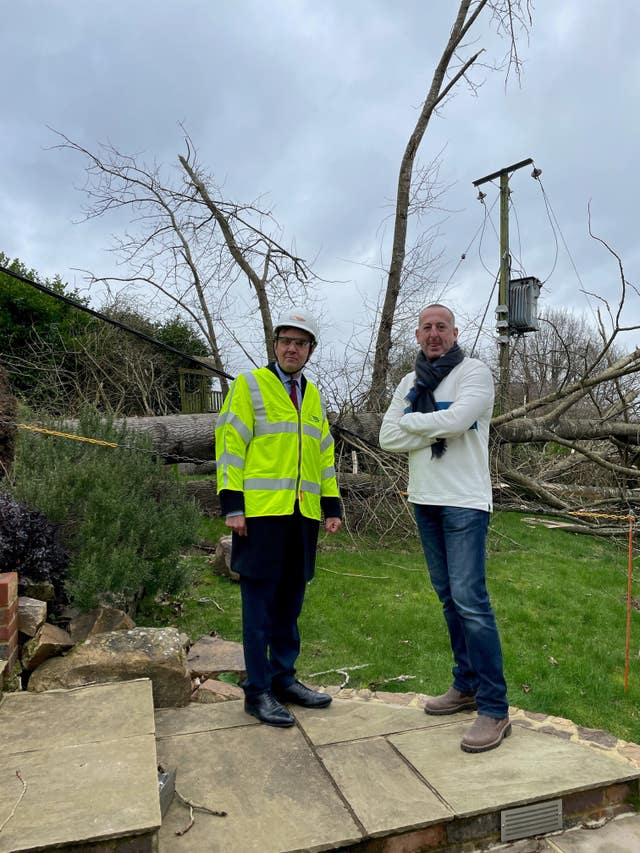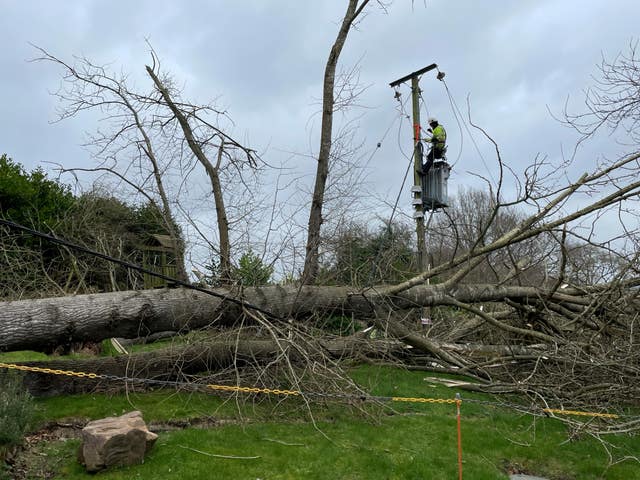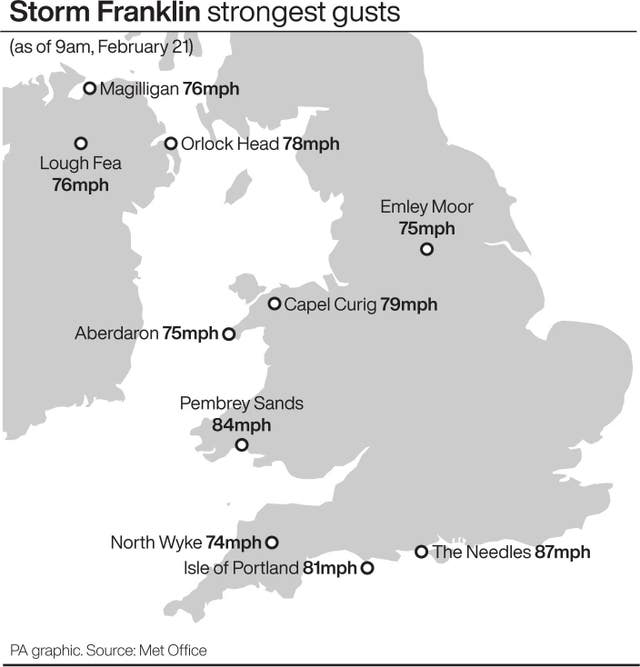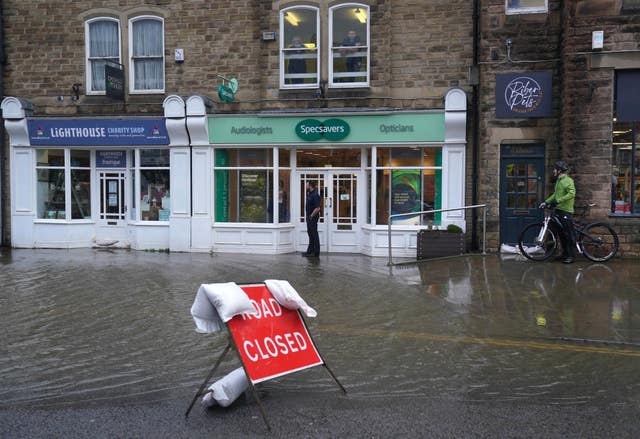Storm Franklin continued to lash the UK with gale-force winds and rain on Monday, with energy crews working to restore power to some 32,000 homes that were still without.
The storm is the third to batter the nation in the past week, and comes days after Storm Eunice left 1.4 million households without electricity.
Energy minister Greg Hands said most had been reconnected, but that Franklin had hampered recovery efforts.

He visited a home in the village of Oldbury, in Kent’s Ightham, where a crew in high-visibility vests was working amid toppled trees and a downed energy line to restore power.
Asked why it was taking days to reconnect all homes, the minister told the PA news agency: “Partly because there’s been follow-up storms – we’ve had Storm Franklin, which has inhibited some of the relief effort and some of the efforts to get people their power back.
“But at times, it’s sometimes filling in those last small areas.
“So just behind me here seven trees have come down, which has cut power to seven households.
“So sometimes it really is, if you like, filling in the last, smaller areas that are without power that are sometimes the most difficult.”
He also said lessons would be learned for the energy network.
“What we do after each storm is we have a lessons learned process, both the Department for Business and Ofgem, the regulator.
“Quite often very significant lessons do get learned: the 105 emergency number for power outages was a lesson learned from a previous storm.”
Mr Hands also expressed sympathy for affected families, saying power outages were a “horrible thing” to happen.
“I admire the resilience that people have shown, I admire the incredible efforts being put in by engineers and other support workers, both here locally and across the UK.
“A lot of help comes in across the UK when these events happen, a lot of mutual aid from other network operators comes in.
“It’s not a happy thing to happen to be without power for some time, but let’s try and get the power back up here as quickly as we can.”
David Thomas, 56, who lives at the home visited by Mr Hands, said he, his wife and children heard an “enormous crash” on Friday morning when the first two trees were blown over.
The trees pulled down a power line, causing an electrical fire that fire crews spent 11 hours putting out.
The retired banker said it had been “frustrating” to be without power since then, but that the family had stayed warm with a wood burner and a rented generator.

A yellow wind warning for England, Wales and south-western Scotland was in place until 1pm, while an amber warning for Northern Ireland expired at 7am.
Winds were peaking during rush-hour, according to Greg Dewhurst, senior meteorologist at the Met Office, who added that they would begin noticeably easing around lunchtime.
Heavy showers lashing northern England and Northern Ireland were set to move south-eastwards, he said.
Storm Franklin’s highest gust of 87mph was recorded at the Needles on the Isle of Wight on Sunday evening, followed by gusts of 79mph on a mountaintop in Wales early on Monday.

Storm Franklin caused widespread rush-hour travel disruption on Monday morning, with National Rail telling customers not to travel as it said there was a reduced timetable, speed restrictions were in place on some routes and further disruption was expected.
The Environment Agency has issued hundreds of flood warning across the UK, as well as a rare “severe” warning for the River Severn at the Wharfage, Ironbridge, where rising water levels pose a “significant risk to life”.
Severe flood warnings for parts of Manchester have been removed, with a spokesman for Manchester City Council saying no formal evacuation of homes near the River Mersey in Didsbury was needed.
Bev Craig, leader of Manchester City Council, said: “Thankfully, because of the skilled management of the flood defences on the River Mersey, major flooding and formal evacuations have been avoided, but as the weather remains unsettled there will likely be disruption on our roads and transport routes, so make sure you check the relevant websites before you travel, take care and give yourself extra time”.
Major flooding across parts of Yorkshire has blocked multiple lines and shuttered South Yorkshire’s Rotherham Central railway station until Tuesday.
Train operator Northern posted a photograph on social media showing the rail line through Rotherham station flooded to the extent that the tracks are not visible.
⚠️ROTHERHAM FLOODING: Trains are unable to call at Rotherham for the rest of the day.
ℹ️ Bus replacements are sadly unable to be provided; customers are advised DO NOT TRAVEL.https://t.co/lZlsirpL6B#NorthernUpdates pic.twitter.com/trKIghIc4R
— Northern 🚆 (@northernassist) February 21, 2022
Streets in the town of Matlock, Derbyshire, have been flooded after the River Derwent burst its banks, with residents posting photos on Twitter and describing the town centre as “a river”.
The River Don burst its banks in the Sprotbrough area of Doncaster in South Yorkshire on Sunday night, and police warned people to stay away from dangerous “fast-flowing” water.
North Yorkshire Fire and Rescue Service reported saving a number of people from stranded cars on the A61 at Harewood Bridge, with more reports of roads left impassable due to flash flooding across the region.

Stretches of the M60 in Greater Manchester and the M6 in Lancashire were closed due to incidents during the storm, including a lorry that hit a bridge and caught fire.
A post on the Lancs Road Police Twitter account said: “High winds caused this HGV to hit a bridge and burst into flames on M6.
“Driver luckily escaped from cab with help from other motorists and is being assessed at hospital.
“Long delays both N+S between J27/28.”
High winds caused this HGV to hit a bridge and burst into flames on M6
Driver luckily escaped from cab with help from other motorists and is being assessed at hospital
Long delays both N+S between J27/28
Good interoperability with @LancashireFRS @HighwaysNWEST #T3TacOps #3098 pic.twitter.com/0ZIUQ3AfiB
— Lancs Road Police (@LancsRoadPolice) February 21, 2022
South Western Railway said Network Rail had cleared more than 50 trees from its network since Friday, but more heavy rain and strong winds on Sunday night caused “even more trees to block the lines and further damage to stations and infrastructure”.
In the capital, where wind gusts are up to around 40mph, London Overground services were cancelled or reduced.
Last week marked the first time three named storms have been recorded within seven days since the storm-naming system began in 2015, with Dudley, Eunice and Franklin.




Comments: Our rules
We want our comments to be a lively and valuable part of our community - a place where readers can debate and engage with the most important local issues. The ability to comment on our stories is a privilege, not a right, however, and that privilege may be withdrawn if it is abused or misused.
Please report any comments that break our rules.
Read the rules here